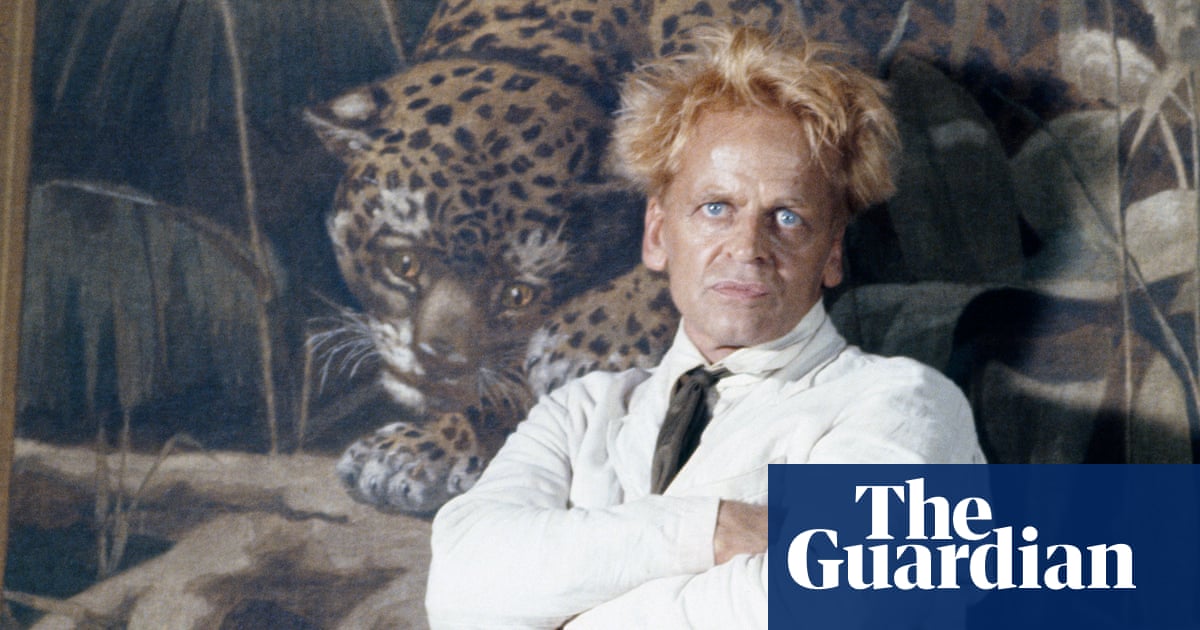A show-stealing villain in spaghetti westerns and slasher flicks with titles such as Schizoid and Psychopath, the German actor Klaus Kinski – “a demented Teutonic version of Dennis Hopper”, as one tribute had it – is known best for his testy collaboration with Werner Herzog, whose 1982 film Fitzcarraldo put Kinski in the title role, lugging a steamship over the Andes. A terror on set as well as on screen, he was offered a part in Indiana Jones but told Steven Spielberg the Raiders of the Lost Ark script was a “pile of shit”.
Benjamin Myers’s new novel plunges us into Kinski’s fevered mind during one of his last performances, a recorded solo stage show in West Berlin in 1971, where he delivered a ferocious monologue as Jesus, “the freest and most modern of men, who preferred to be massacred than rot alive with all the others”. Showcased in a documentary released in 2008 by Peter Geyer, the act descended into chaos, Kinski arguing with hecklers before ending his monologue in a near-empty auditorium.
The book melds Kinski’s on-the-record words with imagined second-person recollection about, among other things, his capture by allied forces as a German conscript, a spell in a psychiatric clinic, and his innumerable sexual conquests. Words scatter randomly across the page in a riot of salty vituperation: Kinski denounces “beatnik Christian youth … so easily offended” and fantasises about shoving the letters of his name “down the gagging gullet of history”.
Cut half a century later to West Yorkshire during lockdown, where an unnamed writer decides to write a book “about the dead German actor Klaus Kinski”. The project looks unsaleable from the off, not least because Kinski’s eldest daughter, Pola, accused him of sexually abusing her. There’s also the fact that “the writer” – let’s call him Benjamin Myers – owes his publisher a “long, era-spanning historical novel concerning an English saint”, and has already spent the advance (this is a reference to 2023’s Goldsmiths prize-winning Cuddy). Yet the “dark and forceful energy” of Kinski’s Jesus keeps drawing him back to online footage. By the time Myers clocks that the actor was 45 in 1971 – the age Myers is in 2021 – “a psychic door of communication [is] opened by the key of coincidence”, and it would basically be rude not to write the book.
after newsletter promotion
If the sections in Kinski’s voice recall David Peace’s The Damned Utd, a more fanciful comparison might be Samantha Harvey’s space novel Orbital, likewise fed by a lockdown YouTube habit. Unlike Harvey, Myers lays bare his workings: biscuit breaks, dog walks, the books he skimmed for research, the ones he didn’t even open, to say nothing of his battle with anxiety and professional self-sabotage, of which the decision to write a book in the voice of an alleged child abuser is one example (“any fully functioning, well-rounded individual would simply not be considering Klaus Kinski at length during such a tumultuous time”).
Yet when the writer pictures the type of novel likely to go down better – “a story about a young woman and her horse, perhaps” – the hesitation risks looking disingenuous; all the more so, once he lays into a younger generation of readers “more boring than their parents”, preferring their artists well behaved and “relatable”. Later, Myers wonders if Kinski’s self-scripted Jesus monologue wasn’t itself a little boring – an insight with potential to torpedo the entire project – but the implications of this thought are swiftly neutralised by instead dissing modern celebrity authors for not staying in their lane.
In other words, this fitfully engaging narrative experiment isn’t really about Kinski or even Myers so much as the 21st-century cultural marketplace. As lapel-grabbing rants give way to downbeat musings, the book exerts a strange charm, ushering us behind the scenes of its own making. “I live freely,” Kinski boasts, unlike people “stuck in … dismal jobs”. Amid the keynote disaffection, you ultimately sense contentment, even joy, that he’s not the only one able to say so.
